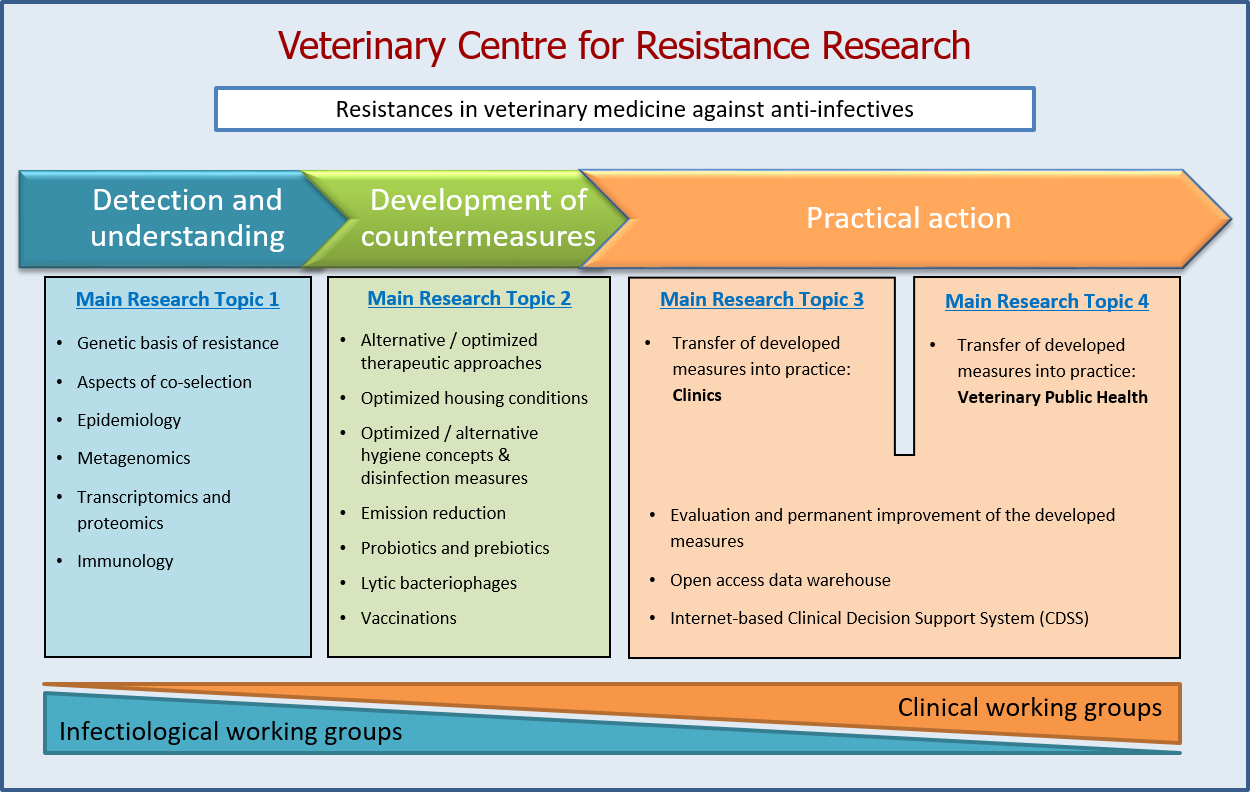Research
Research Concept
By combining basic disciplines with veterinary clinical research, the VCR2 aims to enable the translation of new basic research results in the field of resistance research into diagnostic, therapeutic and hygienic measures with the goal of reducing resistant infectious organisms in veterinary medicine and ultimately in human medicine as well.
To achieve this, four research areas are being addressed at the VCR2, which are closely linked and methodologically directly dependent on each other. Main research topic 1 establishes the molecular basis for the intervention strategies to be developed in main research topic 2. The main research topic 2 focuses on reducing the use of anti-infectives within the framework of anti-infective stewardship, i.e. the use of anti-infectives on the basis of scientific evidence. Building on the research results obtained in main research topic 1 and 2, the translation into veterinary clinics and farms as well as into the veterinary public health will be carried out in main research topic 3 and 4. Here, the methods and measures developed in main research topic 1 and 2 for reducing resistance to antibiotics, disinfectants and antiparasitics are transferred into practice.
Resarch Projects
The VCR² already comprises an interdisciplinary research programme with a translational approach in the establishment phase.
A selection of current projects funded by the DFG, BMBF, BMEL, BMU, EU and other funding organizations in the various research areas of the VCR² are presented below:
- HKP-Mon - Erfassung von Antibiotikaeinsatz und Antibiotikaresistenzen bei Hunden, Katzen und Pferden dazugehörigem Auswertungssystem (BMEL)
(FU Berlin: PD. Dr. Roswitha Merle, Institute of Veterinary Epidemiology und Biostatistics; Prof. Dr. Wolfgang Bäumer, Institute of Pharmacology and Toxicology; Dr. Antina Lübke-Becker, Institute of Microbiology und Epizootics; Prof. Dr. Barbara Kohn, Small Animal Clinic; Prof. Dr. Heidrun Gehlen, Equine Clinic)
- KAbMon - Monitoring zum Antibiotikaeinsatz bei Kälbern verschiedener Aufzucht- und Haltungsformen in Deutschland (BMLE)
(FU Berlin: PD. Dr. Roswitha Merle, Institute of Veterinary Epidemiology und Biostatistics; Prof. Dr. Uwe Rösler, Institute for Animal Hygiene and Environmental Health)
- Successful MRSA (SCHW382/11-1, DFG)
(FU Berlin: Prof. Dr. Stefan Schwarz, Institute of Microbiology und Epizootics)
- Digitalisierung der bakteriellen Toleranzentstehung als Vorstufe zur Resistenzbildung (H. Wilhelm Schaumann Stiftung)
(FU Berlin: Prof. Dr. Marcus Fulde, Institute of Microbiology und Epizootics)
(FU Berlin: Prof. Dr. Thomas Alter, Institute of Food Safety and Food Hygiene)
- Änderung der Verschreibungs- und Anwendungspraxis von Antibiotika seit Novellierung der TÄHAV? (BVL, Gesellschaft für kynologische Forschung)
(FU Berlin: PD. Dr. Roswitha Merle, Institute of Veterinary Epidemiology und Biostatistics; Prof. Dr. Wolfgang Bäumer, Institute of Pharmacology and Toxicology)
(FU Berlin: Prof. Dr. Georg von Samson-Himmelstjerna, Institute of Parasitology and Tropical Veterinary Medicine)
- Understanding Drug Resistance: Experimental Evolution in a One Health Context (Volkswagen Stiftung)
(FU Berlin: Prof. Dr. Georg von Samson-Himmelstjerna, Institute of Parasitology and Tropical Veterinary Medicine)
(FU Berlin: Prof. Dr. Georg von Samson-Himmelstjerna, Institute of Parasitology and Tropical Veterinary Medicine)
- GRK 2046 (DFG)
(FU Berlin: Prof. Dr. Susanne Hartmann, Dr. Sebastian Rausch, Institut für Immunologie; Prof. Dr. Georg von Samson-Himmelstjerna, PD Dr. Krücken, Institute of Parasitology and Tropical Veterinary Medicine)
- EVOLVE-Evolution of vaccine resistant herpesviruses (Volkswagen Stiftung)
(FU Berlin: Prof. Benedikt Kaufer, Ph.D., Institut of Virology)
- Herpesvirus Integration (ERC)
(FU Berlin: Prof. Benedikt Kaufer, Ph.D., Institute of Virology)
- #1Health PREVENT 2 - One Health Interventionen zur Prävention der zoonotischen Verbreitung von antibiotikaresistenten Erregern (BMBF)
(FU Berlin: Prof. Dr. Stefan Schwarz, Dr. Antina Lübke-Becker, Institute of Microbiology und Epizootics; Prof. Dr. Barbara Kohn, Small Animal Clinic; Prof. Dr. Heidrun Gehlen, Equine Clinic)
- OptiBiom: The aim is to characterize the intestinal microbiome in pigs and chicken in order to improve the animal health of food-producing animals and to reduces antibiotic resistance genes (BMBF)
(FU Berlin: Prof. Dr. Jürgen Zentek, Institute of Animal Nutrition)
- PAC-Campy II (BMBF)
(FU Berlin: Prof. Dr. Thomas Alter, Dr. Greta Gölz, Institute of Food Safety and Food Hygiene; Prof. Dr. Uwe, Rösler, Dr. Anika Friese, Institute for Animal Hygiene and Environmental Health; PD Dr. R. Merle, Institute of Veterinary Epidemiology und Biostatistics)
- Campy-Phagen (BMWA)
(FU-Berlin: Prof. Dr. Thomas Alter, Dr. Stefanie Orquera, Institute of Food Safety and Food Hygiene)
- COMBAR - Combating Anthelmintic Resistance in Ruminants (COST EU)
(FU Berlin: Prof. Dr. Georg von Samson-Himmelstjerna, PD Dr. Krücken, Institute of Parasitology and Tropical Veterinary Medicine )
- Lokale Behandlung der caninen Otitis mit Bakteriophagen (Gesellschaft für kynologische Forschung)
(FU Berlin: Prof. Dr. Wolfgang Bäumer, Institute of Pharmacology and Toxicology; Prof. Dr. Thomas Alter, Institute of Food Safety and Food Hygiene; Prof. Dr. Marcus Fulde, Institute of Microbiology und Epizootics)
- KONTRA (BMBF)
(FU Berlin: Prof. Dr. Thomas Alter, Susanne Fleischmann, Institute of Food Safety and Food Hygiene; Prof. Dr. Marcus Fulde, Institute of Microbiology und Epizootics; Prof. Dr. Uwe, Rösler, Institute for Animal Hygiene and Environmental Health)
- UVegg (BMEL)
(FU Berlin: Prof. Dr. Thomas Alter, Susanne Fleischmann, Institute of Food Safety and Food Hygiene)
- KontRed - Entwicklung und Implementierung technologischer Verfahren zur Reduktion von mikrobiellen Kontaminanten im Geflügel- und Schweineschlachtprozess (BMLE)
(FU Berlin: Prof. Dr. Thomas, Institute of Food Safety and Food Hygiene; Prof. Dr. Uwe, Rösler, Institute for Animal Hygiene and Environmental Health)
